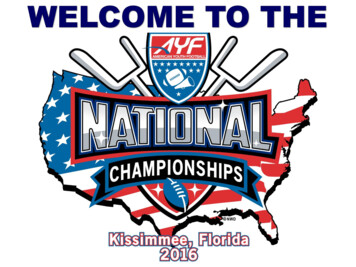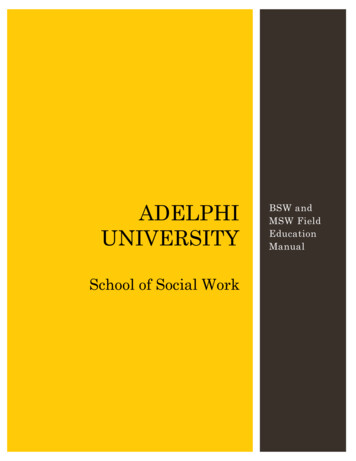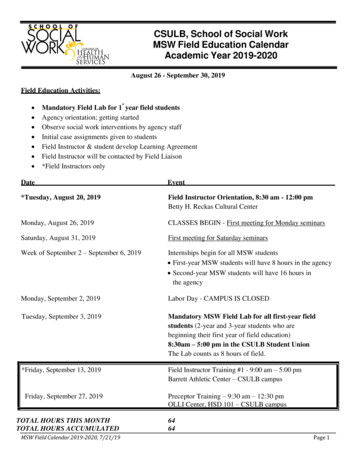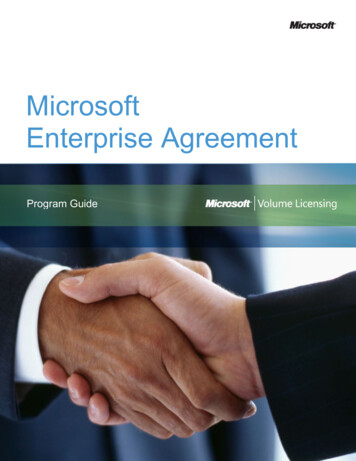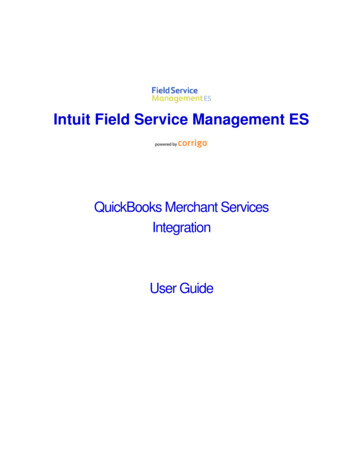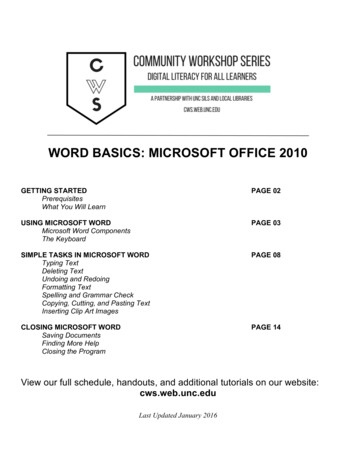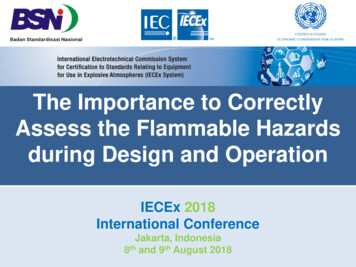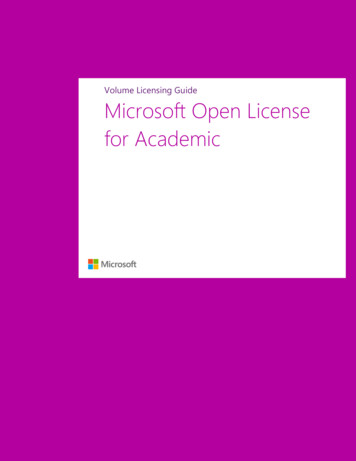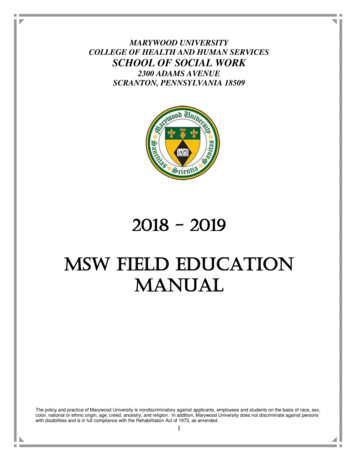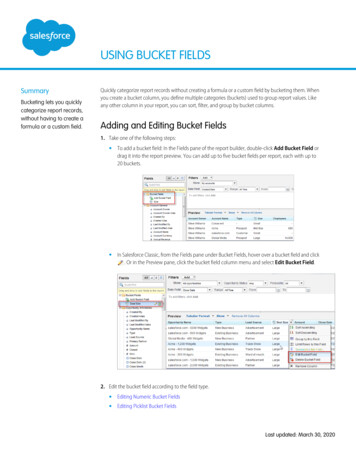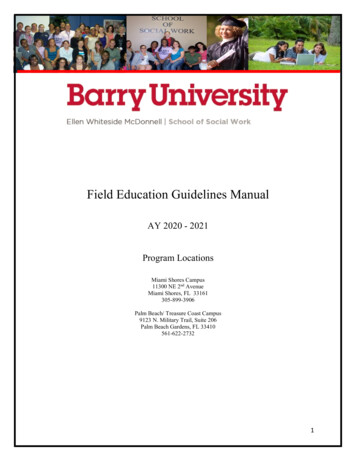
Transcription
Field Education Guidelines ManualAY 2020 - 2021Program LocationsMiami Shores Campus11300 NE 2nd AvenueMiami Shores, FL 33161305-899-3906Palm Beach/ Treasure Coast Campus9123 N. Military Trail, Suite 206Palm Beach Gardens, FL 33410561-622-27321
BLANK PAGE INTENTIONALLY2
ContentsABOUT BARRY UNIVERSITY SCHOOL OF SOCIAL WORK FIELD EDUCATIONFrequently Asked Questions . 6Introduction and Purpose . 9School’s Mission and Curriculum Focus. 9Field Education as the Signature Pedagogy . 9CSWE Competency Standards and Practice Behaviors. 10CSWE Competency Standards and Practice Behaviors for BSW and MSW Foundation . 10CSWE Competency Standards and Practice Behaviors for Advanced Clinical Social Work. 12Field Education Course Curriculum. 15BSW Full-time. 15MSW Full-time, 63-credit . 15MSW Full-time, 32-Credit . 16MSW Part-time, 63-Credit . 16MSW Part-time, 32-Credit . 17Field Internship Placement Eligibility Requirements . 17Criminal Background Checks. 18Professional Liability and Medical Insurance. 18Mandatory Immunization Requirement . 18Selection Process for Field Internship Agencies and Field Educators . 19Agency Selection . 19Selection Criteria . 19Field Educator Selection . 20Task Facilitator . 21Field Educator and Task Facilitator Training . 21Termination of Field Internship Partnership . 22The Field Education Team . 23Director of Field Education . 23Associate Directors of Field . 23Administrative Assistant III . 23Field Advisor. 24Field Placement Process . 243
Own Agency Placement . 25Field Placement Schedule and Attendance . 25Guidelines for Attending Professional Development Events . 26Change of Placement Request . 27Student Request for Change of Field Advisor . 27Discontinuation From Field Placement. 28Required Field Education Assignments. 29Late and/or Non-Submission of Field Education Assignments:. 29Evaluation of Student Performance. 30Final Grade Determination . 30Final Grade Submission Procedure: . 32Memo of Incomplete (MOI) Request Procedure: . 32Guidelines for Appeal of Grades . 32Withdrawal Policies . 35Student Safety in Field Internship. 37Statement On Sexual Harassment . 37Utilization of Social Media Policy . 38Professional Behavior and Decorum of Social Work Students . 39Policy Statement: . 39Expected behaviors . 39Core Performance Standards . 40APPENDIX - CANVAS Student Repository . 414
BLANK PAGE INTENTIONALLY5
Field Education ManualFrequently Asked QuestionsQ: What does Signature Pedagogy mean?A: Field Education is the central form of instruction and learning in which the social workprofession socializes its students to perform the role of practitioner. Field Education courses arerequired as part of the BSW and MSW program curriculums. (p. 9)Q: What is CSWE?A: The Council on Social Work Education accredits undergraduate and graduate Social Workprograms and identifies competency standards and practice behaviors for the field educationcurriculum. (p. 10)Q: How does a student know what Field Education course he/she is supposed to be enrolledin?A: A student can refer to his/her course plan for this information or contact the assigned AcademicAdvisor.Q: How many hours does a student have to complete for each Field Education course?A: Hours vary depending on a student’s field course. Full time students complete the required fieldcourse hours during one semester while part time students complete these hours over two semesters(p. 15-16).SW 495 – 140 hoursSW 497 – 280 hoursSW 537 – 140 hoursSW 577 – 280 hoursSW 675 – 280 hoursSW 689 – 300 hoursQ: What is an Advanced Standing Program?A: An Advanced Standing Program (ASP) is a 32-credit master level program offered to studentswho have earned a BSW degree from a program accredited by the Council on Social WorkEducation. ASP students complete only the concentration year requirements for the MSW degree.(p. 17).Q: Who is the Field Educator?A: A field educator is the agency-based, qualified MSW who orchestrates the learning experiencesfor the student and provides weekly clinical supervision for the student during the internship. Insome rare occasions, the field educator is a BSW supervising undergraduate students. The fieldeducator also reviews and verifies the student’s placement card, agency schedule, timesheets,process recordings, and completes the Learning Plan and the Assessment of Student Competencyin Field Education. (p.20)6
Q: Who is the Task Facilitator?A: A task facilitator is the agency-based individual assigned by the field educator to provideguidance to the student for specific, time-limited learning experiences and/or to direct the student’sday-to-day activities. (p.21)Q: Who is the Field Advisor?A: The field advisor is a Barry employee assigned to provide guidance and support to both thestudent and the field educator during the internship. The field advisor also monitors theprogress/performance of the student while in internship. (p.24)Q: Who do students contact if they have questions about the placement process?A: For any questions about the placement process, students should contact the Associate Directorof Field Education for their respective campus. Prior to starting field placement, students arerequired to complete the Field Application (on-line), attend field orientation and Virtus training aswell as schedule a pre-placement meeting. (p. 24)Q: What types of field placement settings are available for internship?A: Barry offers a variety of field settings including schools, substance abuse facilities, healthcareand mental health organizations, public and non-profit organizations serving diverse communities,juvenile justice, child welfare agencies, rehabilitative facilities, and veteran services. Placement ata specific agency or with a specific population/setting is not guaranteed.Q: Is a student able to complete his/her internship at the current place of employment?A: There are specific criteria that must be met prior to an organization being considered as apossibility for an Own Agency Placement. This can be further discussed/explored with theAssociate Director of Field Education (or designee) at the time the student meets for a preplacement meeting. (p. 25)Q: Are there paid internships?A: Paid internships may be available, however this is not common nor guaranteed. Students caninquire about existing opportunities during the pre-placement meeting.Q: When does a student start field placement?A: Field placement start and end dates are listed in the Field Education Calendar which is sent toField Educators via email at the beginning of each semester. The calendar is also accessible tostudents via Canvas, Student Repository (Field Education). Field placements start dates are alsocontingent upon an agency’s admission process. This process may include background and healthscreenings, agency specific orientations and an acceptance of the student as a "good fit' for theagency.Q: Are there placement opportunities during evenings/weekends?A: Although some agencies provide internship opportunities during evenings and/or weekends,agencies require that students be available during some regular business hours (M-F, 8-6) fortrainings, meetings and/or supervision. Students are required to attend field placement duringregular business hours at least one day per week. (p. 25)7
Q: Do students get credit for field hours during agency/school holidays?A: Students only receive credit for actual hours spent at the internship. These hours have to beverified by the field educator. (p. 26)Q: Can a student change his/her placement if they don’t like it?A: Circumstances that may prompt a need for a change of placement include: lack of appropriatesupervision, agency closure, and lack of learning opportunities based on field course requirements.Prior to submitting a request for a change of placement, the student, field educator and field advisormust meet to explore and implement any viable resolutions. (p. 27)Q: Can a student request to change his/her Field Advisor?A: A student needs to first initiate a meeting with the Associate Director of Field Education todiscuss concerns. (p. 27)Q: What happens if a student is discontinued from internship?A: When a student is discontinued from internship, a meeting with the field educator, student, andfield advisor is held to collect information/data. The outcome of these meetings are used todetermine whether the student will be presented with a Core Performance Review and whether thestudent will be replaced at another agency and/or be assigned a grade of NC (no credit) for thefield course. (p. 28)Q: Who determines the final grade in field education?A: Once all field course requirements are met, a grade recommendation is provided by the fieldeducator via completion of the Assessment of Student Competency in Field Education. Thisrecommendation is reviewed and confirmed (or opposed) by the field advisor and submitted to theAssociate Director of Field Education. Final grade determination is made by the Director of FieldEducation. (p. 31)Q: What happens if a student does not complete the total number of required hours by theend of the semester?A: Students should discuss this matter with the field advisor who will assist them in completing aMemo of Incomplete Request (MOI). (p. 32)Q: Where can a student access Field Education related forms (i.e. Change of Placement, OwnAgency Placement)?A: All forms are listed in Canvas under the Student Repository (Field Education) and can bedownloaded.8
Introduction and PurposeThe purpose of this manual is to provide essential information to students, faculty, field advisors,field educators, and administration regarding the philosophy, organization, expectations, andguidelines for field education in both the BSW and MSW programs at Barry University School ofSocial Work.School’s Mission and Curriculum FocusGrounded in the liberal arts tradition, Barry University is a scholarly community committed to thehighest academic standards in undergraduate, graduate and professional education. In the Catholicintellectual tradition, integration of study, reflection and action inform the intellectual life. Faithfulto this tradition, a Barry education and university experience foster individual and communaltransformation where learning leads to knowledge and truth, reflection leads to informed action,and a commitment to social justice leads to collaborative service (Barry University Missionstatement, 2008).The mission of the Barry University School of Social Work is framed by the core values, ethics,and commitments of the social work profession and Barry University mission. Within a culturallydiverse framework, the School is committed to educating social workers for professional socialwork practice that is informed by context and characterized by competence, skills of leadership,quality, the quest for social and economic justice in local and global communities, and dedicationto continuous professional growth and development.Field Education as the Signature PedagogyField education is highlighted by the Council on Social Work Education as the central form ofinstruction and learning in which a profession socializes its students to perform the role ofpractitioner (CSWE, 2008). Trauma-informed and resiliency-focused are the conceptual lynchpinsof the curriculum for both the BSW and MSW programs. Trauma-informed recognizes thesignificance of “trauma” in creating human vulnerability and impacting human relationships.Resiliency-focused is critical to finding and mobilizing individual strengths, resources, andcapacity for recovery, healing, and further development of resiliency proficiency. The intent offield education in the School of Social Work, therefore, is to assist students in connecting thetheoretical and conceptual framework of the curriculum with the practical world of the practicesetting.Although students enrolled in Field Education Courses spend the majority of their time at theirinternship, Field Educatioin is a course. In this course you learn to apply the knowledge gained inthe classroom to direct practice. While enrolled in this course students will attend three full classsessions per semester. These classes are design to help bridge theory and practice;, to offerextended learning opportunities and allow students to present and discuss cases. All students areexpected to attend each scheduled class. Failure to attend may result in course failure.9
CSWE Competency Standards and Practice BehaviorsBoth the BSW and MSW programs’ curricula content, including field education, are guided by the9 core competencies and related practice behaviors identified in the Education Policies andStandards provided by CSWE. In the MSW program, the single concentration reflects the PracticeBehaviors developed by CSWE for Advanced Social Work Practice in Clinical Social Work(2009). Additional practice behaviors that reflect the school’s academic goals are included as partof the single concentration in advanced clinical Social Work practice.CSWE Competency Standards and Practice Behaviors for BSW and MSW FoundationCompetency 1: Demonstrate Ethical and Professional Behavior Make ethical decisions incorporating understanding of trauma, trauma reflective treatment,research, and policies along with trauma-informed organizational practice, the NationalAssociation of Social Workers (NASW) Code of Ethics, models of ethical decisionmaking, and relevant laws, policies, and regulations. Use reflection and self-regulation to manage personal values and maintain professionalismin practice situations. Demonstrate professional demeanor in behavior, appearance, and oral, written, andelectronic communications. Use technology ethically and appropriately to facilitate trauma-informed practiceoutcomes. Use supervision and consultation to guide professional judgment and behavior.Competency 2: Engage Diversity and Difference in Practice Apply and communicate understanding of the importance of diversity and difference inshaping Present themselves as learners and engage clients and constituencies as experts of theirown experiences. Apply self-awareness and self-regulation to manage the influence of personal biases andvalues in working with diverse clients and constituencies. Understand and build knowledge regarding the powerful impact of diversity factors inshaping trauma experiences, help seeking behaviors, and responses to trauma.Competency 3: Advance Human Rights and Social, Economic, and Environmental Justice Understand and apply intersectional knowledge between human rights and principles oftrauma informed care when working with individuals, families and communities. Engage in trauma informed practice that advance social, economic, and environmentaljustice.Competency 4: Engage in Practice-informed Research and Research-informed Practice Use trauma-focused practice experience and theory to inform scientific inquiry andresearch. Apply critical thinking to engage in analysis of quantitative and qualitative researchmethods and research findings. Use and translate research evidence to inform and improve trauma-focused practice, policy,and service delivery.10
Competency 5: Engage in Policy Practice Identify social policy at the local, state, and federal level that impacts well-being, servicedelivery, and access to social s
guidelines for field education in both the BSW and MSW programs at Barry University School of Social Work. School’s Mission and Curriculum Focus . Grounded in the liberal arts tradition, Barry Univ
